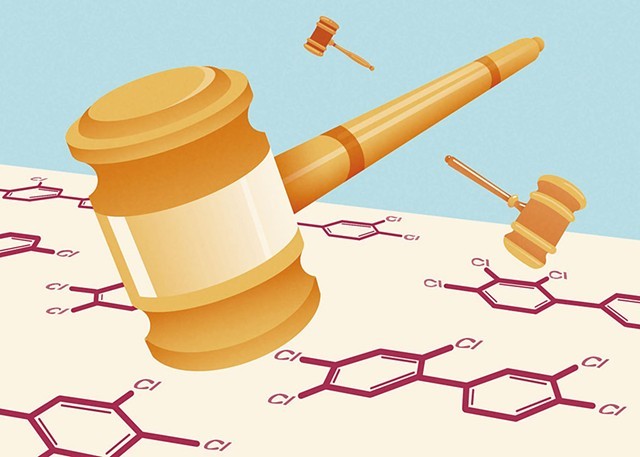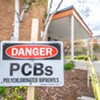
- File: Diana Bolton
The lawsuit, filed on December 20 in U.S. District Court, is the latest legal action against the company in Vermont, which has embarked on a first-of-its-kind initiative to test schools statewide for airborne PCBs.
In the most recent suit, plaintiff Kristy Crawford, who is now in her forties, alleges that exposure to the chemicals when she was an elementary school student at Twin Valley from 1982 to 1990 led to later-in-life reproductive issues and non-Hodgkin lymphoma, which she was diagnosed with in 2022.
Related Chemical Crossroads: Lawmakers Consider Pausing Vermont's Ambitious, Costly and One-of-a-Kind Plan to Address PCBs in Schools

Chemical Crossroads: Lawmakers Consider Pausing Vermont's Ambitious, Costly and One-of-a-Kind Plan to Address PCBs in Schools
Education
Monsanto was the sole producer of PCBs in the U.S. between the 1930s and 1977. The chemicals were used in fluorescent light ballasts and construction materials such as caulk, paint and glue.
Despite internal memos showing that the company knew PCBs were hazardous, the lawsuit states, it failed to warn customers and continued to promote the use of the chemicals in school construction projects. In 2016, the International Agency for Research on Cancer classified PCBs as "carcinogenic to humans." The U.S. Environmental Protection Agency has also found other health issues that stem from certain levels of PCB exposure, including negative effects on the immune, endocrine and reproductive systems.
Crawford is seeking compensatory damages for physical injury, pain and suffering, and emotional and mental distress; medical expenses; lost wages; loss of enjoyment of life; punitive damages; and attorneys' fees and costs.
Despite internal memos showing that the company knew PCBs were hazardous, the lawsuit states, it failed to warn customers and continued to promote the use of the chemicals in school construction projects. In 2016, the International Agency for Research on Cancer classified PCBs as "carcinogenic to humans." The U.S. Environmental Protection Agency has also found other health issues that stem from certain levels of PCB exposure, including negative effects on the immune, endocrine and reproductive systems.
Crawford is seeking compensatory damages for physical injury, pain and suffering, and emotional and mental distress; medical expenses; lost wages; loss of enjoyment of life; punitive damages; and attorneys' fees and costs.
Last spring, state-mandated PCB testing at Twin Valley found a high concentration of the chemicals in multiple rooms of the school, which was built in 1969. Airborne PCB levels in the gym and auditorium far exceeded the state's "immediate action levels" for the chemicals, which led the school to close those rooms. After installing carbon air-filtration units intended to lower the concentration of PCBs, test results actually showed even higher levels of the chemicals.
Related PCBs Contamination Closes Library, Gym at Twin Valley Elementary

PCBs Contamination Closes Library, Gym at Twin Valley Elementary
Education
Crawford is represented by Milberg Coleman Bryson Phillips Grossman, a national firm that specialized in federal class-action litigation. The firm is also representing the city of East St. Louis, Ill., in a case that alleges a nearby Monsanto factory that made PCBs polluted its land and buildings.
Millberg attorneys Jim DeMay and Zach Howerton said they are looking to represent others in Vermont who have developed health problems after being exposed to PCBs in schools where elevated levels of the chemicals have been found through state testing.
"Unfortunately, we absolutely do think there are others out there," DeMay said.
Related Vermont and Its Schools Sued Over PCBs. Will They Win?

Vermont and Its Schools Sued Over PCBs. Will They Win?
News
In a statement, a Monsanto spokesperson said Crawford's allegations lack merit.
"The weight of the scientific evidence does not support a causal connection between exposure to PCBs and the types of injuries alleged in the case, even among highly exposed former PCB workers," the statement reads, in part. Additionally, a Monsanto spokesperson said that the company isn't liable because it manufactured only bulk industrial PCBs, not the building products used in the construction of schools.
"The weight of the scientific evidence does not support a causal connection between exposure to PCBs and the types of injuries alleged in the case, even among highly exposed former PCB workers," the statement reads, in part. Additionally, a Monsanto spokesperson said that the company isn't liable because it manufactured only bulk industrial PCBs, not the building products used in the construction of schools.
"The Company also maintains that it provided its own customers with accurate information about the benefits and risks of PCBs that were known at the time," the spokesperson said.
Related Vermont Sues Monsanto Over PCB Contamination

Vermont Sues Monsanto Over PCB Contamination
News
Clarification, January 4, 2023: This story was updated to include additional context from a Monsanto spokesperson.














Comments
Comments are closed.
From 2014-2020, Seven Days allowed readers to comment on all stories posted on our website. While we've appreciated the suggestions and insights, right now Seven Days is prioritizing our core mission — producing high-quality, responsible local journalism — over moderating online debates between readers.
To criticize, correct or praise our reporting, please send us a letter to the editor or send us a tip. We’ll check it out and report the results.
Online comments may return when we have better tech tools for managing them. Thanks for reading.